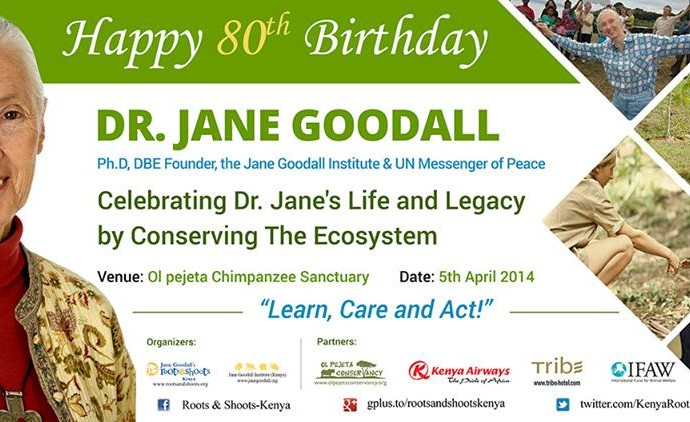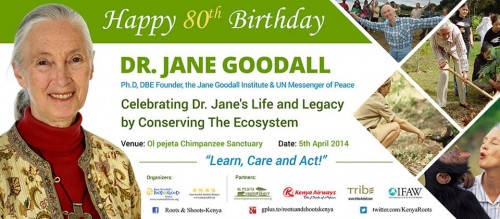April 5th 2014 marked the official celebration of Dr. Jane Goodall’s birthday at Ol Pejeta Conservancy, Nanyuki. As WSA, we got an opportunity to be part of celebrating one of the world’s conservationist’s legends.
Dr. Jane Goodall is a primatologist, an ethologist, an anthropologist, founder of the Jane Goodall institute and the Roots and Shoots Programme and also a UN Messenger of Peace. She is mostly known for her study in chimpanzees, for being a true conservationist and also her fight in animal welfare, especially in the plight of the chimps.
Jane Goodall, through her many years in the field has taught us to respect nature by showing us the importance of chimps in the ecosystem and just like any other wild animal need protection from any unwanted human interference.
Keynote speakers were present at the event. This included, Douglas Cress, GRASP programme Coordinator; Alpana Patel, Jane Goodall Institute – Kenya Board Chairperson; Deputy County Warden– Laikipia region, Vincent Ongwae and Amanda Flint, Roots and Shoots goodwill ambassador.
To commemorate this day, a cake cutting ceremony took place which was followed by a short tour within the Chimpanzee sanctuary in Ol Pejeta where we learnt more on the physical and behavioural aspects of chimps. A tree planting event also took place shortly later.
Chimp Facts
- Chimps live for 50 years in the wild and 60 years in captivity.·
- Chimpanzees are one of our closest living relatives. In fact, humans and chimpanzees share 95 to 98 percent of the same DNA!·
- Chimpanzees make and use tools. In fact, they use more tools for more purposes than any other creature except human beings.
- Chimpanzees develop lifelong family bonds, particularly between mother and child. Mothers and dependent young (up to age seven or so) are always together.
- Chimpanzees can currently be found in 21 African countries. The greatest concentration of chimpanzees is in the rain forests of what used to be the equatorial forest “belt”.
- Chimpanzees are omnivores, which mean they eat fruits, nuts, seeds, blossoms and leaves, as well as many kinds of insects and occasionally medium-sized animals.
- Chimpanzees communicate in many ways, most notably through sounds and calls. They also communicate with each other through touch, facial expressions and body language.
- Chimpanzees are knuckle walkers, which means they walk on all fours using their knuckles for support when they are on the ground or even when they are up in trees.
- Chimpanzee habitat is rapidly disappearing as human activity increases in the areas where chimpanzees live. Some of the causes for habitat loss include the conversion of land into agriculture, competition for natural resources such as firewood, commercial logging and mining.
- Chimpanzees can catch and be infected with a number of human diseases.
- Chimpanzees are endangered. At the turn of the 20th century, they numbered between 1 and 2 million. Now there are estimated to be fewer than 300,000 chimpanzees remaining in the wild.
- Chimps have decreased in number due to habitat destruction, logging and bush meat consumption among human beings.
- Chimps have also being sold as slaves, imprisoned, starved and isolated.

